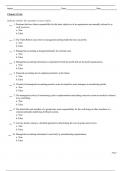Exam (elaborations)
Test Bank for Cornerstones of Managerial Accounting, 4th Canadian Edition by Mowen
- Course
- Managerial Accounting
- Institution
- Managerial Accounting
Test Bank for Cornerstones of Managerial Accounting 4ce 4th Canadian Edition by Maryanne M. Mowen/Don R. Hansen/David J. McConomy/Bradley D. Witt. ISBN-13: 5261 Full Chapters test banks are included. Chapter 1: Introduction to Managerial Accounting What Is Managerial Accounting? Comparison ...
[Show more]



